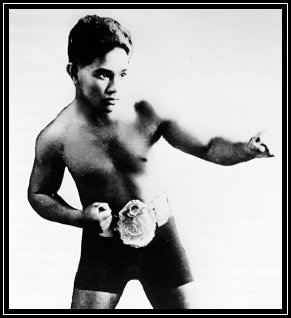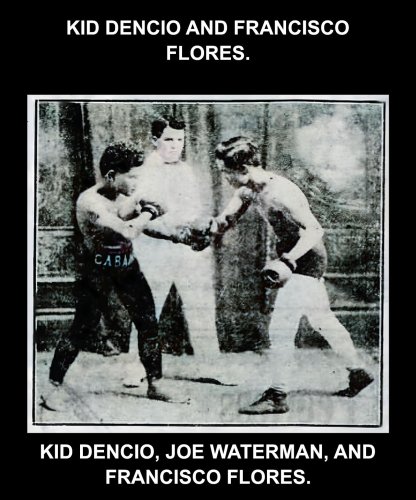
|
Philippines, 25 Feb 2026 |
Home >> News |
 |
||||
|
|
|
|
Gaudencio Cabanela, Sr.: The Premier Filipino Boxing Superstar By Emmanuel Rivera, RRT PhilBoxing.com Fri, 05 Apr 2024  Gaudencio Cabanela, Sr. lived a brief yet remarkable life. His rapid ascent and subsequent decline in the boxing world continue to elicit feelings of pride and sorrow among those who recall his journey. According to the founding fathers of Philippine boxing—Frank Churchill, the brothers Tait (Stewart and Edwin), Joe Waterman, Ed Gallaher, and Bill Miller—Kid Dencio remains the greatest boxer they witnessed in action, a sentiment echoed by many. Born on February 27, 1900, in San Fernando, Pampanga, in the midst of the Philippine-American War, dubbed the Filipino Insurrection by the conquering soldiers of Uncle Sam, Cabanela did not live long enough to achieve his crowning glory. Filipino, American, and Australian promoters, matchmakers, and entrepreneurs vied for the chance to represent him. He never took a formal boxing lesson and learned the art and craft of boxing by sheer observation and practical application. As an all-around helper, a factotum as the Yankee masters used to call maids and boys, Cabanela worked at the United States Navy Copper shop, working alongside American and Filipino sailors and soldiers repairing boats and ships, at below minimum wage equivalent $1.50 a week. He surreptitiously trained with the established military boxers, even sparring with much larger men. It was Marine Edward Gallaher who discovered his potential, one day, observing one of his soldiers heaving a medicine ball at Dencio’s jaw for strengthening. Kid Olongapo was sent to Frank Churchill and Stewart Tait in Manila to begin more rigorous training at the Olympic Club in Quiapo then at the Palomar Pavilion in Tondo, Manila. Joe Waterman once wrote, “Dencio is indeed a marvel. He was employed in the Naval Station copper shop at Olongapo, three years ago, and saw so much boxing between American sailors and marines that he, too, took an interest in the game. He was taken in hand by Mr. Ed Gallaher, and improved to such an extent, that he was never defeated in 25 contests during 12 months. He then went to Manila, and has been the reigning sensation there since. Though only 5 ft. 1 in. height, this kid has the remarkable reach of 69 inches. He is the undisputed bantam, feather and lightweight champion of the Orient, and has only been defeated decisively once during his career, that by Llew Edwards, a man who outweighed him seven pounds, and had six years' experience on him to boot. (source: The Referee (Sydney, NSW : 1886 - 1939, Wednesday 7 January 1920, page 11)  Kid Dencio was the premier Filipino boxer to achieve superstar status in a short amount of time. In 47 recorded bouts, Kid Dencio’s sterling record stands at 34 wins (18 KO), 7 losses (3 KO), and 5 draws. Cabanela was the first big local fighter to draw standing room only crowds. The grand Olympic Stadium, with a capacity of 6,500 plus 2,000 SRO, was not big enough to contain the fans. He was, at one time, the bantamweight, featherweight and lightweight champion of the Orient. He ran through the competition that foreign fighters had to be imported. The world of boxing lost the first Filipino boxing superstar on July 2, 1921 in Melbourne, Australia. After 13 grueling rounds in a fight he was winning, Dencio turned his back on Bert McCarthy, inexplicably pointing at his head, with a sheepish smile. He collapsed, was taken to St. Vincent’s Hospital, and fell into a coma. He died at 1:15 a.m. Rebecca Sheehan, a renowned Australian academician and historian, discussed the challenges that beset Dencio Cabanela in her landmark paper 'Little giants of the ring: fighting race and making men on the Australia-Philippines boxing circuit. “Despite being dehumanized and marginalized by Oriental discourse, exploited by laissez-faire capitalism, and controlled by the boxing culture, his marketability was undeniable. The Manila English-language press appropriated him, attempting to mold him into a sports idol reflecting American influence and power, garnering both criticism and praise. However, instead of conforming, he emerged as an idol who bolstered Filipino resistance to foreign control. Beloved by the Filipino masses, championed by nationalists, and admired by all for his prowess in the ring, Cabanela remained an unassailable idol. Elevated to the symbolic defender of Filipino honor, race, and nation, his transition from adored idol to noble hero upon his death earned him fleeting yet ultimate national recognition. Though not a saint, but merely a talented Filipino youth with boxing gloves, his destiny, shaped by historical events, was nothing short of extraordinary. Cabanela's boxing career in the Philippines and Australia illustrates how his life and death, influenced by time and place, held profound social significance for Filipinos.” The Philippine Boxing Historical Society and Hall of Fame honors Mr. Gaudencio Cabanela, Sr. for his tremendous contributions to Philippine boxing history. Notes of Appreciation: It was an honor speaking with Professor Rebecca Sheehan and discuss her landmark paper called: Little giants of the ring: fighting race and making men on the Australia-Philippines boxing circuit, 1919–1923 Book: Australia's Asian Sporting Context, 1920s – 30s By: Rebecca Sheehan Edition 1st Edition First Published 2013 Imprint Routledge Pages 15 eBook ISBN 9781315868318 Rebecca Sheehan is a lecturer in History and Gender Studies in the Department of History & Archaeology at Macquarie University, an Associate Member of the History Department at Harvard University, and a member of Macquarie’s Centre for Media History. Click here to view a list of other articles written by Emmanuel Rivera, RRT. |
|
|
PhilBoxing.com has been created to support every aspiring Filipino boxer and the Philippine boxing scene in general. Please send comments to feedback@philboxing.com |
PRIVATE POLICY | LEGAL DISCLAIMER
developed and maintained by dong secuya © 2026 philboxing.com. |